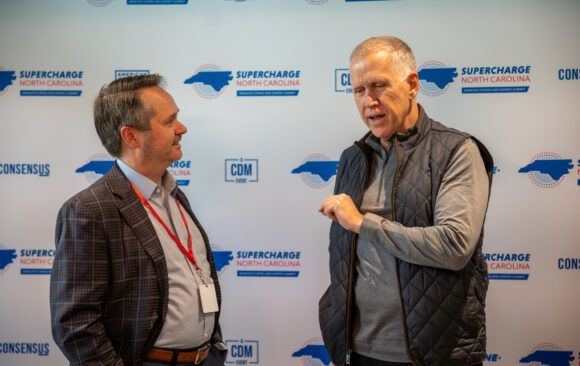Business leaders, elected officials, and policy experts recently gathered at the Supercharge North Carolina Manufacturing and Energy Summit to celebrate the state’s leadership and discuss ways to drive innovation forward. John Hart was in attendance promoting C3 Solutions’ message of advancing economic freedom to accelerate environmental progress. The event included a keynote address from Senator Thom Tillis (R-NC), who said:
“I want more of these energy solutions to be based in North Carolina and exported throughout the world and the United States. I want the United States of America to be the majority intellectual property owner for the next generation of energy and climate solutions throughout the world, and you all can play a very important part.”
North Carolina is a national leader in clean power generation with abundant shares of nuclear and solar energy. The Tar Heel State ranks fourth nationwide in solar production and in 2022 renewables generated 14% of North Carolina’s electricity. Nuclear power, meanwhile, meets nearly one-third of the state’s electricity needs making North Carolina the fifth-largest nuclear power-producing state in the U.S.

John Hart speaks with Sen. Thom Tillis (R-NC) at Supercharge NC.
At the same time, North Carolina is leading the charge toward developing the next generation of chip and battery technology, receiving hundreds of millions of dollars in public and private investment through recent pieces of federal legislation including the Infrastructure Investment and Jobs Act.
>>>READ: Here are the Leading Renewable Energy States
State policymakers have implemented a series of pro-growth policies to catalyze investment in the Tar Heel State. Last year, the legislature passed HB130, which prohibits local governments from implementing ordinances that prohibit connection, reconnection, modification, or expansion of an energy service based on the type and source of the energy provided. This bill will benefit job creators who pay commercial and industrial utility rates by providing flexibility and predictability for investing in clean energy sources.
The General Assembly also passed SB678 in 2023 which modified the state’s renewable energy portfolio standard to a technology-neutral clean energy portfolio standard that includes nuclear power. While it would be more ambitious to eliminate such mandates altogether, a technology-inclusive approach is better than one that singles out renewables.
The state has set ambitious goals to reduce emissions by 70% (versus 2005 levels) by 2035, before reaching carbon neutrality by 2050. To meet these goals North Carolina’s utilities will shutter the state’s remaining coal plants by 2035 and pursue a broad set of technologies including natural gas, nuclear power (traditional and advanced), and renewable energy and storage.
A mix of pro-growth energy policies and competitive tax rates have attracted substantial clean energy investment in the state. According to the Clean Economy Tracker, a dashboard that visualizes clean tech investments across the nation, North Carolina has received $20 billion in clean manufacturing investments since 2016. In total, this funding will support 35 facilities and an estimated 17,000 jobs, 77% of which will be in Republican districts.
>>>READ: Could Solid-State Batteries Accelerate Electric Vehicle Adoption?
A majority of these projects are related to battery manufacturing. For instance, since 2021 Toyota has announced nearly $14 billion in funding for the launch of its Liberty, North Carolina battery facility. The plant is expected to begin rolling out batteries for the auto manufacturer’s fleet of SUVs and hybrids in 2025 while creating over 5,000 jobs.
North Carolina is also home to the deployment of cutting-edge advanced nuclear power. GE Hitachi, headquartered in Wilmington, is working with Bill Gates-backed TerraPower to deploy one of the nation’s first advanced reactors. Part of the Department of Energy’s Advanced Reactor Demonstration Program, the collaboration will deploy TerraPower’s Natrium sodium-cooled fast reactor at the site of a coal plant in Wyoming. Fast reactors are especially promising because they can run on spent fuel and could help to address the country’s nuclear waste challenges.
While there are many other policy reforms that would make North Carolina even more economically competitive, that state has many examples of how good economic policy can go hand-in-hand with good environmental policy. As the North Carolina Manufacturing and Energy Summit shows, the Tar Heel State is well positioned to lead the country in bringing the next generation of affordable, clean energy online.
The views and opinions expressed are those of the author’s and do not necessarily reflect the official policy or position of C3.
